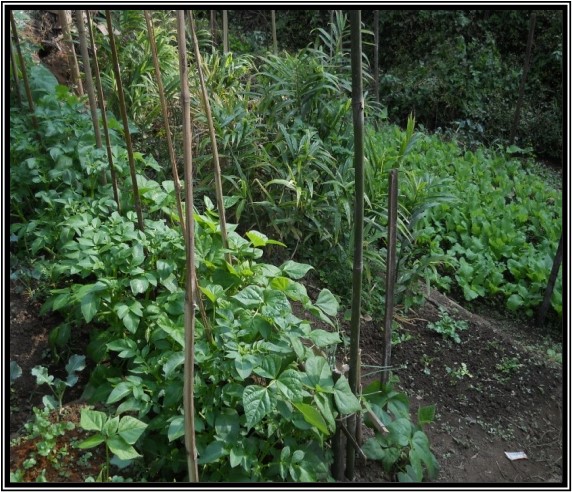Ri-Bhoi District in Meghalaya is an agricultural area and the majority of the people depend on agriculture for their livelihood. The Rabhas belong to the Indo Mongoloid group of people and are similar to other members of the Bodo group such as the Kachari and Hajong. Rabhas, who once lived in the forest and practiced shifting cultivation, were deprived of their rights to the forest by the colonial rulers since the formation of a forest department that banned shifting cultivation and demarcation of forest boundaries. Consequently, with the colonial land settlement system, most of the displaced Rabhas took refuge in the forest villages as plantation laborers. After independence, the Indian Government continued the same colonial system of forest management where communities like Rabhas could not regain their rights to the forest.
Umshru is one of the villages where the Rabhas have migrated and settled in Jirang Block Meghalaya. The village has 165 households with a population of 585 including men, women, and children. The traditional occupations of the Rabhas are agriculture (shifting cultivation) and weaving. Besides shifting cultivation, the people cultivate rice and maize in the lowland for their consumption.


The practice of shifting cultivation in this village has had a devastating and far-reaching impact in degrading the environment. With the increase of population, the earlier practice of 10-15 years cycle of shifting cultivation on a particular land has reduced to 2-3 years. This has resulted in large-scale deforestation and soil and nutrient loss. Kitchen gardening was never practiced by the families since they depended mostly on wild vegetables which they collected from the forest, but gradually due to deforestation, the wild vegetables have also started to disappear and this has affected the food security and income of the families.
NEICORD, through its Food Security Initiative, works in 18 villages and serves three communities living in this block–the Rabha, the Khasi, and the Garo. Umshru village is one of the villages in which NEICORD has selected to work with the Rabhas. The people in this village were initially motivated and mobilized to form a Farmers’ Club. The formation of a Farmers’ Club paved the way for NEICORD to work closely with the people and to capacitate the people in different areas such as group management, leadership, new methods of cultivation such as System of Rice Intensification (SRI), Sloping Agriculture Land Technology (SALT) and kitchen garden.
The process of rapport building and capacity building of the farmers took one year. When the people were capacitated, they realized that they need to change their way of thinking and way of practice, and they need to preserve and care for the natural resources which God had blessed them with. With the additional support of the Farmers’ Forum, the farmers were further capacitated in various methods of agricultural practices. Gradually, the families have started practicing kitchen gardens for their consumption.


In the upland, the people have given up the practice of shifting cultivation but have adopted the more permanent and sustainable method of SALT and in the lowland, the community has started practicing the method of SRI instead of conventional methods. These changes in their methods of cultivation have brought about a tremendous change in the community. Currently, there are 16 households that are practicing SALT, 22 households practicing SRI, and 61 households that are practicing kitchen gardens. Aside from these, the farmers were also provided training on composting which they have adopted and applied to their SALT farm, SRI, and kitchen gardens. Their Farmers’ Club is functioning effectively where farmers meet once a month to discuss issues related to farming, exchange learning with members, and share success stories. This change in practice has helped the farmers gain family food security.
Before the intervention from NEICORD, the families had food security only for 4-5 months in a year and for the rest of the year, they struggled to search for jobs as agricultural and non-agricultural laborers outside their village. In case of non-availability of work, they often remained unemployed for 3-4 months in a year. Due to lack of food and income, their children often fell sick and never had the chance to attend school. Currently, out of the 165 households, 99 households have food security for 12 months due to the new practices such as SALT, SRI, and kitchen garden.
“As a family, we are now improving our consumption pattern and our food is also more nutritious. These practices have also helped in improving our income enabling us to meet our needs. Our food availability in the family has also increased from 7 months (prior to the intervention of NEICORD) to 12 months”, said Pranab Doloi.
Now their agricultural fields and kitchen gardens are a source of pride as the community transformed them from shifting land and wasteland into productive fields and gardens. The community members harvest fresh vegetables as per their household requirements while the extra production is sold in the village for other community members at an economic price so that others can also enjoy nutritious food in the family. Now the community sees their agriculture fields and gardens as a source of food and also as a source of income with which they can educate their children.
“We feel so blessed by the intervention of NEICORD. We never thought that we could become healthier and wealthier farmers,” said the members of the Friends Farmers’ Club of Umshru.

Comments are closed